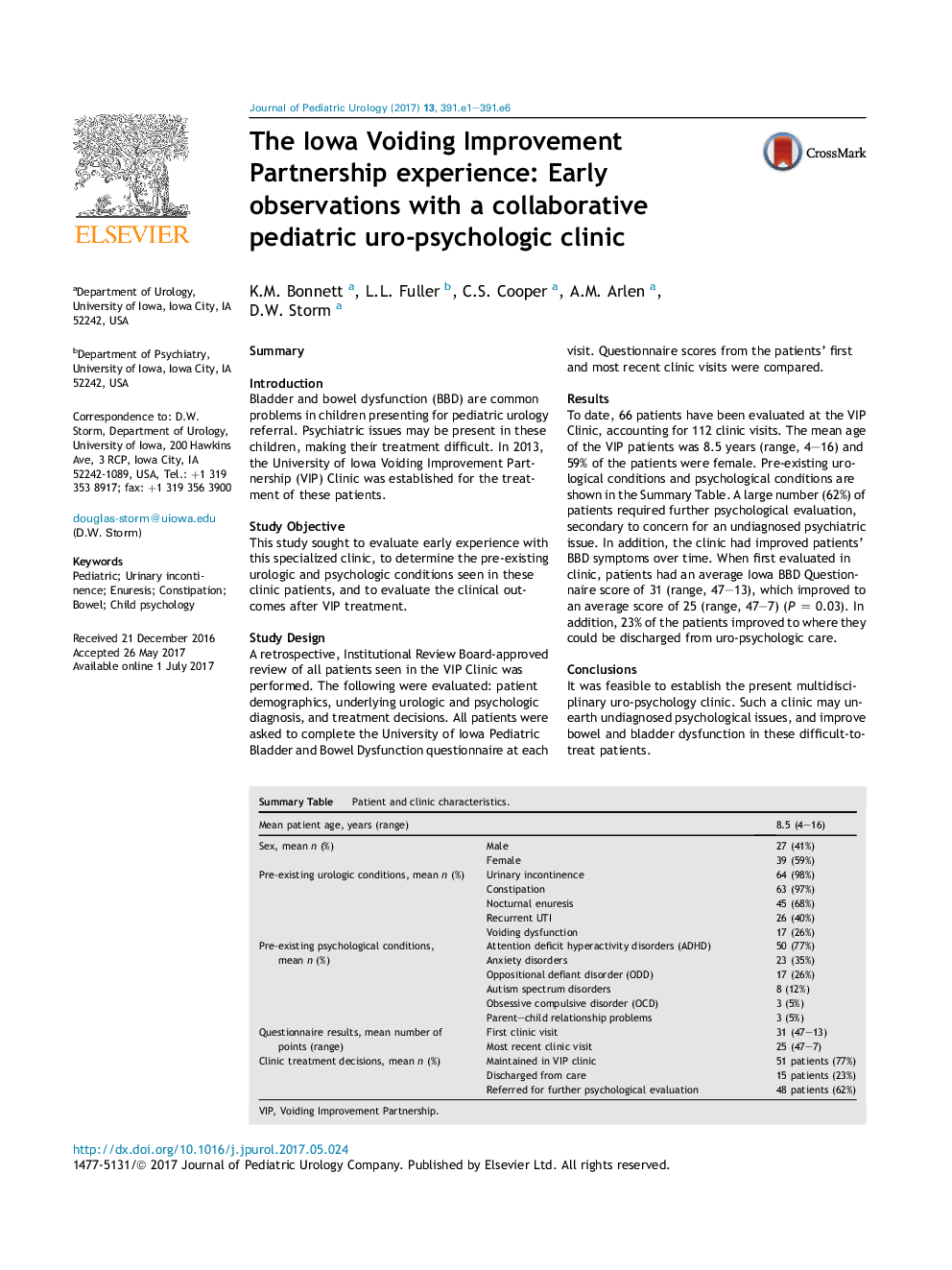| کد مقاله | کد نشریه | سال انتشار | مقاله انگلیسی | نسخه تمام متن |
|---|---|---|---|---|
| 5718559 | 1607135 | 2017 | 6 صفحه PDF | دانلود رایگان |
SummaryIntroductionBladder and bowel dysfunction (BBD) are common problems in children presenting for pediatric urology referral. Psychiatric issues may be present in these children, making their treatment difficult. In 2013, the University of Iowa Voiding Improvement Partnership (VIP) Clinic was established for the treatment of these patients.Study ObjectiveThis study sought to evaluate early experience with this specialized clinic, to determine the pre-existing urologic and psychologic conditions seen in these clinic patients, and to evaluate the clinical outcomes after VIP treatment.Study DesignA retrospective, Institutional Review Board-approved review of all patients seen in the VIP Clinic was performed. The following were evaluated: patient demographics, underlying urologic and psychologic diagnosis, and treatment decisions. All patients were asked to complete the University of Iowa Pediatric Bladder and Bowel Dysfunction questionnaire at each visit. Questionnaire scores from the patients' first and most recent clinic visits were compared.ResultsTo date, 66 patients have been evaluated at the VIP Clinic, accounting for 112 clinic visits. The mean age of the VIP patients was 8.5 years (range, 4-16) and 59% of the patients were female. Pre-existing urological conditions and psychological conditions are shown in the Summary Table. A large number (62%) of patients required further psychological evaluation, secondary to concern for an undiagnosed psychiatric issue. In addition, the clinic had improved patients' BBD symptoms over time. When first evaluated in clinic, patients had an average Iowa BBD Questionnaire score of 31 (range, 47-13), which improved to an average score of 25 (range, 47-7) (PÂ =Â 0.03). In addition, 23% of the patients improved to where they could be discharged from uro-psychologic care.ConclusionsIt was feasible to establish the present multidisciplinary uro-psychology clinic. Such a clinic may unearth undiagnosed psychological issues, and improve bowel and bladder dysfunction in these difficult-to-treat patients.Summary Table. Patient and clinic characteristics.Mean patient age, years (range)8.5 (4-16)Sex, mean n (%)Male27 (41%)Female39 (59%)Pre-existing urologic conditions, mean n (%)Urinary incontinence64 (98%)Constipation63 (97%)Nocturnal enuresis45 (68%)Recurrent UTI26 (40%)Voiding dysfunction17 (26%)Pre-existing psychological conditions, mean n (%)Attention deficit hyperactivity disorders (ADHD)50 (77%)Anxiety disorders23 (35%)Oppositional defiant disorder (ODD)17 (26%)Autism spectrum disorders8 (12%)Obsessive compulsive disorder (OCD)3 (5%)Parent-child relationship problems3 (5%)Questionnaire results, mean number of points (range)First clinic visit31 (47-13)Most recent clinic visit25 (47-7)Clinic treatment decisions, mean n (%)Maintained in VIP clinic51 patients (77%)Discharged from care15 patients (23%)Referred for further psychological evaluation48 patients (62%)VIP, Voiding Improvement Partnership.
Journal: Journal of Pediatric Urology - Volume 13, Issue 4, August 2017, Pages 391.e1-391.e6
